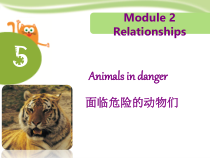 PPT
PPT
【文档说明】沪教版英语六年级上册《Unit 5 Animals in danger》优质PPT课件.ppt,共(81)页,25.527 MB,由小喜鸽上传
转载请保留链接:https://www.ichengzhen.cn/view-144545.html
以下为本文档部分文字说明:
5Module2Relationships面临危险的动物们AnimalsindangerSouthChinatigerGiantpanda华南虎大熊猫Bluewhale蓝鲸Ilike…Theyare…Theylive…T
heyliketo…Theyusually…Wildanimals[ˈθaʊznd]num.一千thousandsof成千上万的['hʌndrəd]num.一百当hundred前有基数词时,hundred要用单数形式threehundredpandas三百
只熊猫Canyoureadthem?ninethousandfivehundredsevenhundredandforty-twoeightthousandfourhundredthreehundredandtwenty-nineonet
housandthreehundredandfifty-fiveCanyoureadthem?431920880060067672345dangern.危险•dangern.•dangerousadj.•indanger•濒临危险•outofdanger
•脱险•eg.Thepandasareindanger.wild•wildanimals•inthewild•wildanimalsindangeradj.野生的n.野生环境野生动物在野生环境面临危险的野生动物[waɪld]inthepast在过去Thereweren’tsoman
ycarsinthepast.在过去没有这么多的小汽车。Howmanypandasarethereinthewild?aSixhundred.bOnethousandsixhundred.cOnethousandandsix.HowmanySouthChinatigersare
thereinthewild?aAbouttwenty.bAboutthirty.cAboutforty.Howmanybluewhalesarethereinthewild?aOnethousand.bTenhundred.cTenth
ousand.Inthepast,therewere…Butnowthereare…AnimalsindangerinthepastnowIt’sbig/…Itcan/…Ithas…Wecannotseesome
kindsofwildanimalsnow.Aurochs(欧洲野牛)livedinEurope.Theywerebigandheavy.Theylookedlikecows.Dodos(渡渡鸟)livedonalittleisland.Theywerebigbirdswithsmallwi
ngs.Theywerecute.Notverylongago,thereweremillionsandmillionsofpassengerpigeons(旅鸽)inNorthAmerica.Theywerever
ycommoninthatpartoftheworld.Apassengerpigeononlylaidoneeggeachspring.Thisanimalisaquagga(斑驴).ItlivedinSouthAfrica.Itlookedalittlelik
eazebraandalittlelikeahorse.Theelephantbird(象鸟)livedonanisland.Itwasthreemetrestall.Itwasalsotheworld’sbiggestbird.Thelastelephantbirdlived
aroundThemoa(恐鸟)wasahugeostrich(鸵鸟).ItlivedinNewZealand.Ithadverystronglegs.Somekindsofwildanimalsaredyingoutnow
.GiantpandasliveintheforestsofChina.Theylikeeatingbamboos.Ababypandaisverysmall.Theorang-utan(猩猩)lookslikeaman.Ithas
longarms.Itlivesinwetwarmforests.Thisstrange-lookinganimalisanaye-aye(狐猴).Aye-ayesareverysmall.Theylivein
treesandcomeoutatnightforfood.Peoplekillthembecausetheythinkaye-ayesbringbadWemuststopkillingtheseanimalsforfood,fortheirskin,orjustforspor
t.Theseanimalsdonothaveenoughfoodorcleanwater.Wemusthelpprotecttheirhomes.Theseanimalslosttheirhomesbecausepeoplecutdowntreesinthefor
ests.Wemusthelpsavethetreesandforests.Talkaboutananimal:Thisanimalisindanger.Inthepast,therewere…Butnowthereare…Theylive…Theyhave/had…Weca
n…tosavethem.Whatcanwedotosavetheanimalsindanger?Whatcanwedotosavetheanimalsindanger?•find–found••fi
ndout•查明,弄清楚wayn.路;路线;方式;方法•onone'swaytosp.•在某人去某地的路上•onthewaytosp.•在去某地的路上•onmywaytoschool•onherwaytothep
ark•onmywayhome在我回家的路上•onmywayhere在我来这的路上•onmywaythere在我去那的路上•副词:home,here,there前省略介词to•takecareof•=lookafter•eg.Sheto
okcareofherpet.•=Shelookedafterherpet.•她照顾她的宠物。两个照顾昨天我在家照顾我妹妹了。Itookcareofmysisterathomeyesterday.Ilookedaftermysisterathomeyester
day.•drivev.驾驶•driveacar•drivern.司机•driveaway驱赶•eg.ElsadroveawaytherhinoandsavedJoy.sendv.发送;寄•sendsb
.sth.•sendsth.tosb.(双宾语结构)•寄/送给某人某物•sendsbbacktosp.•把某人送回某地•eg.HesenthisfriendacardduringChristmas.•eg.Hesen
tacardtohisfriendduringChristmas.•eg.ThenJoysentherbacktothewild.•givesb.sth.=givesth.tosb.•showsb.sth.=showsth.tosb.•se
llsb.sth.=sellsth.tosb.•bringsb.sth.=bringsth.tosb.•takesb.sth.=takesth.tosb.•throwsb.sth.=throwsth.tosb.•buys
b.sth.=buysth.forsb.•cooksb.sth.=cooksth.forsb.learnv.学会,学习learn-learnt近义词:studyThisisagoodwaytolearnEnglish.这是学习英语的一个好方
法。learn…from向……学习learnabout了解learnChinese学习语文learnEnglish学习英语alot很;非常•alotof=lotsof许多;大量•修饰[C]复数以及[U]•eg.Elsagrewupandlearn
edalot.•艾尔莎长大了并且学会了许多。•lateadj.迟到的;晚了的•belateforschool•belateforclass•belateforthemeeting•lateradj;后来的adv.后来•threeyears
later•三年后•latestadj.最近的;最新的•thelatestnews•最新消息diev.死,死亡die-dyingMike’scatdied.麦克的猫死了。die-died•1.find[faɪnd]v.发现;找到•2.way[weɪ]n.
路;路线;方式•3.die[daɪ]v.死•4.care[keə]n.关心•5.save[seɪv]v.拯救;节省•6.rhino[‘raɪnəʊ]n.犀牛•7.send[send]v.发送;寄•8.learn[lɜːn]v.学习
•9.later[‘leɪtə]adv.adj.后来•10.takecareof照顾•11.goforawalk去散步•12.driveaway赶走•13.growup成长•14.alot很;非常(做状语)•find-found[faʊnd]•take-took[tʊk]•go-went•
see-saw•drive-drove[drəʊv]•save-saved•live-lived•die-died•grow-grew[ɡruː]send-sent[sent]have-hadlearn-learned['lɜ
ːnd]/learnt•['elsə]•埃尔莎I’mJoy.Iworkwithanimalsinthewild.Ilovemyjob.Ilovealltheanimalstoo.Hello,boysandgirls.Comeandhelpme,please.I’mill.Canyo
uhelpmetakecareofmylittledaughterElsa?1.WhodidJoyfindonherwayhome?2.WhydidJoytakecareofElsa?ShefoundElsaon
herwayhome.BecauseElsa’smotherdied.1.Whatdidtheysee?2.WhatdidElsado?Theysawarhino.Elsadroveawaytherhino.1.HowlongdidJoya
ndElsalivetogether?2.Whathappenedthen?Theylivedtogetherformanymonths.JoysentElsabacktothewild.1.Whathappenedthreeyearslater?2
.HowmanybabiesdidElsahave?JoymetElsaagain.Shehadthreebabies.Joyworkedwithwildanimals.ShefoundElsaonherway
home.Elsa’smotherdied,soJoytookcareofher.Oneday,JoyandElsawentforawalk.Theysawarhino.Elsadroveawayth
erhinoandsavedJoy.JoyandElsalivedtogetherformanymonths.Elsagrewupandlearntalot.ThenJoysentherbacktothewild.
Threeyearslater,JoysawElsaagain.Elsahadthreebabies.Joywasveryhappytoseeher.glueclueJunetunebooklookcookfoodMoonl
oop1.Retellthestory“JoyandElsa”.2.Writeapassageaboutanimalsindanger.3.FinishWorkbookpages30and31.Homework
 辽公网安备 21102102000191号
辽公网安备 21102102000191号
 营业执照
营业执照